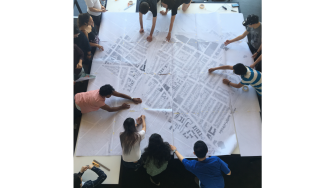Master of City Planning
- Commencing Terms
- Term 1 & 3
- Duration
- 2 Year(s)
- Delivery Mode
- Face-to-face (includes blended)
- Campus
-
Kensington
- Codes
- Program code 8148
- CRICOS code 088355A
-
Commonwealth Supported Places are available for this program2026 Indicative CSP first year fee
- $9,500*
-
2026 Indicative CSP fee to complete degree
- $19,500*
-
2026 Indicative first year full fee
- $49,000*
-
2026 Indicative full fee to complete degree
- $102,500*

Application closures for 2026
International applications for all undergraduate programs, as well as postgraduate programs offered by the faculties of Arts, Design & Architecture, Engineering (excluding Master of Information Technology and associated programs) and Science are now closed to New Overseas Student Commencement (NOSC) for 2026 intakes.
Postgraduate programs offered by the Business School and the faculties of Law & Justice and Medicine & Health remain open. Master of Information Technology (and associated programs) also remain open.
- Overview
- Entry requirements
- What will I study?
- Future careers
- How to apply
- Fees & Scholarships
Overview
Do you want to take a more active role in shaping how cities grow? Are you ready to build on your existing experience and step into more complex planning work? The two-year, accredited UNSW Master of City Planning deepens your analytical, policy and communication skills. It prepares you to work across government, industry and communities to investigate and resolve urban and regional planning challenges. You’ll graduate with the skills to design sustainable, equitable, healthy and inclusive spaces that improve quality of life and contribute to real-world issues.
As part of UNSW Arts, Design & Architecture, you’ll work alongside students and professionals from across the built environment, gaining exposure to diverse perspectives and approaches. You’ll explore key areas of contemporary planning, from city renewal and city analytics through to housing policy and healthy, sustainable communities.
UNSW's strong industry connections and world-leading research through the City Futures Research Centre position you to enter Australia's planning sector with confidence. The Master of City Planning opens doors to progressive career paths across a range of organisations. Our graduates consistently secure roles that drive urban innovation and determine how communities grow and thrive.
Key features
Master diverse planning disciplines
Explore a broad range of urban issues through theory and practice, preparing you for diverse, future-focused careers. Areas of study include:
- Ubran design
- City economics and development
- Environment and sustainability
- City building – infrastructure and transport
- Strategic spatial planning
- Planning law and administration
- Planning research and analysis
- Urban management and development assessment
- Urban equity and health
- City analytics
Launch your career with professional accreditation and industry connections
Graduate with Planning Institute of Australia accreditation and access to Australia's leading urban research through the City Futures Research Centre. Build valuable networks through strong industry partnerships while studying in Sydney – a world city that serves as your living classroom.
Specialised capstone project
Complete a major capstone project in your second year to deepen knowledge in your chosen specialisation. This advanced work empowers you to kick-start your planning career by adding significant professional portfolio pieces that demonstrate your expertise to potential employers.
Why study at UNSW?
Want to see more from UNSW Arts, Design & Architecture?
Entry requirements
To gain entry into the Master of City Planning, you’ll need a bachelor’s degree with a credit average or above (Weighted Average Mark 65+).
If you have already completed an Australian planning degree that is accredited by the Planning Institute of Australia, this program is not designed for you. Instead, please consider the Master of Property and Development, the Master of Landscape Architecture or the Master of Environmental Management.
If you have an undergraduate degree in a cognate discipline, or you’ve partially completed a relevant postgraduate program, you can apply to have this study recognised via Recognition of Prior Learning (RPL). If your prior study is recognised, credit for certain subjects will be counted towards the Master of City Planning.
What is a cognate discipline?
City and urban planning are interdisciplinary in nature, which is why we recognise the benefits that students from diverse academic backgrounds bring to this program. If you’ve studied any of the following subject areas in your undergraduate degree, you may be eligible for RPL.
- Built environment subject areas, including: architecture, landscape architecture, construction, property development and urban design.
- Social, economic and environmental science subject areas, including: geography, urban studies and sociology, demography, economics, social policy and politics, communication studies, health studies, international development, environmental ecology, environmental management, environmental sustainability.
- Law/Jurisprudence
- Environmental and civil engineering subject areas, including surveying and spatial science degrees.
RPL for these study areas will be limited to 24 Units of Credit (UOC), which is normally the equivalent of 4 subjects.
Admission pathways
If you don’t meet the entry requirements outlined above, you may be eligible to study the Graduate Certificate in City Planning, then continue into the Master’s degree once this is complete. This will be at the discretion of the Program Director or Academic Coordinator who assesses applications on a case-by-case basis.
English language requirements
You may be asked to provide evidence of your English proficiency to study at UNSW depending on your educational background and citizenship. English language skills are vitally important for coping with lectures, tutorials, assignments and examinations - this is why UNSW requires a minimum English language competency for enrolment.
If you’re completing an Australian Year 12 qualification (e.g. NSW HSC or equivalent), you do not need to provide anything extra to prove your proficiency. Your qualification will be used as evidence of your English proficiency.
If you do need to provide evidence of your English proficiency, this will be indicated in your application. You can prove this by providing evidence that you meet one or more of the following criteria:
- English language tests and university English courses
- Prior study in the medium of English
- Other qualifications
If you need to improve your English skills before you start your degree, UNSW College’s Academic English Programs are for you. The programs are suitable for various English levels and help you prepare for university studies and life in Australia.
For more details, visit the English Language Requirements page.
To gain entry into the Master of City Planning, you’ll need a bachelor’s degree with a credit average or above (Weighted Average Mark 65+).
If you have already completed an Australian planning degree that is accredited by the Planning Institute of Australia, this program is not designed for you. Instead, please consider the Master of Property and Development, the Master of Landscape Architecture or the Master of Environmental Management.
If you have an undergraduate degree in a cognate discipline, or you’ve partially completed a relevant postgraduate program, you can apply to have this study recognised via Recognition of Prior Learning (RPL). If your prior study is recognised, credit for certain subjects will be counted towards the Master of City Planning.
What is a cognate discipline?
City and urban planning are interdisciplinary in nature, which is why we recognise the benefits that students from diverse academic backgrounds bring to this program. If you’ve studied any of the following subject areas in your undergraduate degree, you may be eligible for RPL.
- Built environment subject areas, including: architecture, landscape architecture, construction, property development and urban design.
- Social, economic and environmental science subject areas, including: geography, urban studies and sociology, demography, economics, social policy and politics, communication studies, health studies, international development, environmental ecology, environmental management, environmental sustainability.
- Law/Jurisprudence
- Environmental and civil engineering subject areas, including surveying and spatial science degrees.
RPL for these study areas will be limited to 24 Units of Credit (UOC), which is normally the equivalent of 4 subjects.
Admission pathways
If you do not meet the requirements for direct entry into your chosen degree, you may be eligible for a pathway program with UNSW College. UNSW College provides alternative entry options using university-approved content so that you can start your UNSW journey with confidence.
You may also be eligible to study the Graduate Certificate in City Planning, then continue into the Master’s degree once this is complete. This will be at the discretion of the Program Director or Academic Coordinator who assesses applications on a case-by-case basis.
English language requirements
You may be asked to provide evidence of your English proficiency to study at UNSW depending on whether you are from an English-speaking background or non-English speaking background. English language skills are vitally important for coping with lectures, tutorials, assignments and examinations - this is why UNSW requires a minimum English language competency for enrolment.
If English is not your first language, you’ll need to provide proof of your English proficiency before you can be given an offer to study at UNSW. You can do this by providing evidence that you meet one or more of the following criteria:
- English language tests and university English courses
- Prior study in the medium of English
- Other qualifications
If you need to improve your English skills before you start your degree, UNSW College’s Academic English Programs are for you. The programs are suitable for various English levels and help you prepare for university studies and life in Australia.
For more details, visit the English Language Requirements page.
Check the specific English language requirements for this program
What will I study?
UNSW is introducing a new academic calendar from 2028.
We are moving to a new flex-semester calendar. What does this mean for your studies?
Program structure
The Master of City Planning is a two-year degree that prepares you to tackle the complex challenges facing modern cities and regions.
Capstone project
In your final year of study, you’ll undertake a major capstone project, where you’ll focus on a particular area of specialised interest. You can choose between an independent research thesis or a major urban design studio.
Optional specialisation
There’s also the option to incorporate a City Analytics or Urban Design specialisation into your Master of City Planning degree. This involves completing four courses on your chosen specialisation instead of four prescribed electives.
Professional accreditation
Course offerings satisfy key competence areas required by the Planning Institute of Australia, ensuring you graduate with both professional accreditation and the analytical, collaborative and communication skills in high demand across multiple sectors.
Full program structure
This program contains a total of 96 units of credit (UOC) and can be completed in two years of full-time study. Each university year at UNSW has three terms and an optional summer study period. You can study full-time or part-time, typically fitting two or three courses into a term and one course in a summer term.
Students must complete:
Core courses – 54 UOC
Land & Environment Law – 6 UOC
Land Use Policy & Practice – 6 UOC
City Equity & Wellbeing – 6 UOC
Urban Design – 6 UOC
City Building - Infrastructure Planning – 6 UOC
City Economics, Urban Development & Finance – 6 UOC
Planning Techniques & Analysis – 6 UOC
Strategic Spatial Planning – 6 UOC
Sustainable Development and the Urban Environment OR Sustainability and Habitability – both 6 UOC
Prescribed electives or optional specialisation – 24 UOC
Students must complete at least four prescribed elective courses OR an optional specialisation in either City Analytics or Urban Design
Capstone courses – 18 UOC
There are two pathways to choose from: A major independent research thesis OR urban design studio
Both options offer the opportunity to deepen expertise in a specialised area
For more information about the Master of City Planning and its learning outcomes, visit the Handbook.
Future careers
City planners play a key role in addressing complex urban challenges, such as climate change, housing affordability and sustainable development. Our graduates are in-demand and work in planning and urban policy-related roles across all tiers of government (Federal, State, Local), as well as in private sector consultancies, property development and other built environment professions where planning skills are required. The typical salary for an urban planner in Australia is $90,000 per year (Seek, 2026).
Potential careers
- City analyst
- Development assessment planner
- Environmental planner
- Heritage officer
- Housing policy advisor
- Local government planner
- Property developer
- Social and community planner
- Strategic planner
- Transport planner
- Urban consultant
- Urban data analyst
- Urban designer
- Urban policy analyst
- Urban policy officer
Accreditation
Planning Institute of Australia
How to apply
Applications must be submitted through our Apply Online portal. We encourage you to submit your completed application as early as possible to ensure it will be processed in time for your preferred term. Some high-demand programs and Faculties with limited places may have an earlier application deadline or commencement date. Find out more.
Ready to start your application?
For most international students, applications are submitted via our Apply Online service. We encourage you to submit your completed application as early as possible to ensure it will be processed in time for your preferred term.
Some high-demand programs with limited places, may have an earlier application deadline or may have an earlier commencement date. For details, visit the international admissions information page.
Ready to start your application?
Fees & Scholarships
There are a limited number of Commonwealth Supported Places (CSP) available for this degree/program. Your eligibility to receive a CSP will be automatically assessed when you apply. Please note that eligibility for Commonwealth Supported Places (CSPs) is competitive, with places awarded based on academic merit.
Start your postgraduate application today with our guide on how to apply.
Commonwealth Study Assistance such as Austudy, and Youth Allowance is available for some master’s degrees. For the most up-to-date information and list of degrees visit UNSW Current Student Financial Support.
*The indicative Commonwealth Supported Place (CSP) fees are an estimate based on the relevant student contribution band/s for a Commonwealth Supported Place undertaking a standard full-time load of 48 units of credit per year (1 Equivalent Full Time Student Load/1 EFTSL). To find out more about Commonwealth Supported Places visit Postgraduate Commonwealth Support.
Indicative fees are a guide only and have been calculated based on the typical enrolment patterns of students undertaking the degree/program. The indicative fee listed here is an estimate for tuition only and excludes non-tuition fees and charges. The amount you pay will vary depending on the calendar year of enrolment, the courses you select and whether your study load is more or less than 1 Equivalent Full Time Student Load (48 units of credit (UOC) per year).
You should not rely on indicative fees as fee increases are assessed when required and may exceed the indicative figures listed here. Actual fees are calculated on enrolment. More information on fees can be found at the UNSW fees website.
*Fees are subject to annual review by the University and may increase annually, with the new fees effective from the start of each calendar year. The indicative fees listed here are based on an estimated average and are for tuition only, other fees and charges are not included. The amount you pay will vary depending on the calendar year to enrol, the courses you select and whether your study load is more or less than 1 Equivalent Full Time Student Load (8 courses per year).
Indicative fees are a guide for comparison only based on current conditions and available data. You should not rely on indicative fees. More information on fees can be found at the UNSW fees website.
Indicative fees to complete the program have been calculated based on a percentage increase for every year of the program. Fee increases are assessed annually and may exceed the indicative figures listed here.
Indicative fees to complete the program include tuition plus an estimate of study-related costs of approximately $1,000 per year. To find out more about other costs, visit UNSW International.
Scholarships
At UNSW, we award over $83 million in scholarships each year. We pride ourselves on rewarding excellence and making university accessible to students from all walks of life. Whether you’re a domestic or international student, our range of scholarships, prizes and awards can support your journey.
Progress starts here – at a world-leading university

Top 20 Worldwide
UNSW is ranked #20 university in the world
QS World University Rankings, 2024–2026

Most Employable Graduates
Winner of the AFR Most Employable University Award six years in a row
AFR Top100 Future Leaders Awards, 2020–2025

Australia's #1 for Innovation
Highest number of startups and spinouts from university-developed tech
SCOPR report, 2024





